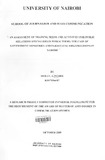| dc.description.abstract | Organizations without a direct training effort are merely asking employees to acquire job
knowledge and skill in their individual ways on a haphazard and unorganized basis.
Through direct training, the employer also has the opportunity to build mutually
rewarding attitudes. The need for continuous training effort is constantly increasing.
Skills and knowledge in many job areas often become obsolete in frighteningly short
periods of time. Technological advances can cause skill obsolescence in even a few years
(Craig, 1967).
In line with the above paragraph, this study set to research on the training needs
assessment for public relations practitioners in the public firms in Nairobi. The
organizations studied included 24 government ministries and 4 parastatal organizations,
all based in Nairobi.
Survey design was used in the study. A population of 70 public relations specialists was
targeted and only 52 responded. Self-administered questionnaires were used in the
collection of primary data. The study used both quantitative and qualitative methods to
analyze data elicited from the respondents.
The key finding of this study was that PRPs in the govern-m.ent and parastatal organizations lack training in many areas of their profession. The major areas where need
for training were evident included events management, time management, budget
monitoring, public speaking, pitching, strategic thinking, presentation skills and team
building.
The study found that training was a valuable need for PRPs, in both the government and
parastatal organizations, as was indicated by the higher percent of those who suggested
that they should be trained in strategic management, they should be provided with
refresher courses, and they should be trained in Information Technology (IT), crisis
management and should be sponsored for Masters degree. Through these needs, the study
came to discover the presence of training gaps in the public PR organizations.
The study revealed that most PRPs in the government are not satisfied with the education
they received from school. This showed that knowledge from school is not enough.
Organizations must participate in developing the school knowledge by offering PRPs
training in several areas of their profession. Out of the many day to day tasks of a public
relations specialist, these were rated as the most oftenly performed; media monitoring,
branding, and events organization amongst others
In conclusion, the study presented evidence that there were training gaps in the public PR
organizations. Most of the responses, especially related to training revealed that majority
of the public relations specialists/ practitioners are in need of additional knowledge and
skills in the form of training to the advantage of both of them and their organizations. It
was evident that among other issues, most PR organizations in the public sector limited
training methods to workshops and seminars. These two methods were cited by the
respondents as the most frequently used and most effective methods of training. Other
training methods should also be given a priority for purposes of making comparisons.
Although most PR practitioners undertook a lot of PR activities in their respective firms,
majority lacked training in various areas of their)asks and as such the implication is that
most public PR organizations under perform because training, which is very essential to an organization, should be an ongoing activity, but it is totally lacking, or available only
minimally. All evidence from the research indicates that training in PR organizations is
wanting. | en |

